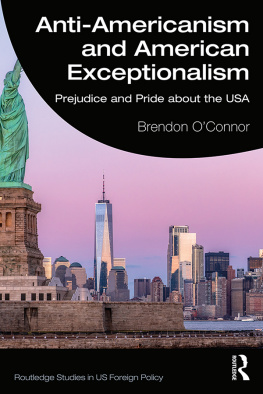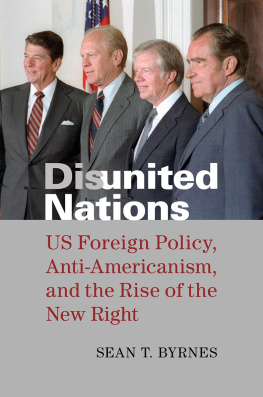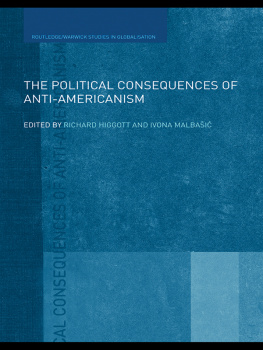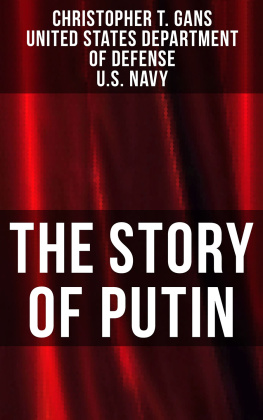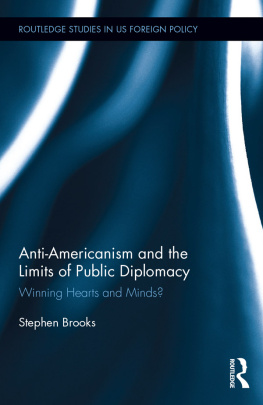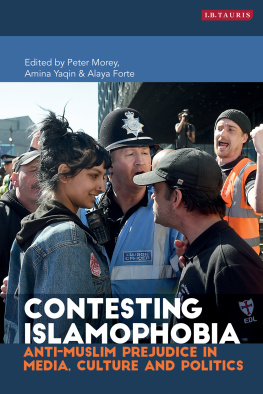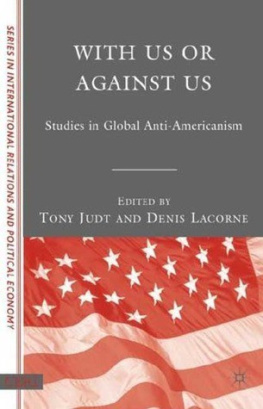One of the most insightful and prolific scholars of anti-Americanism on the planet, Brendon OConnor has produced an essential book for the age of Trump. With sharp analysis of politics, culture, and foreign policy, OConnor cuts through two centuries of mythmaking surrounding anti-Americanism to help us distinguish between ideological prejudice and salutary critique.
Max Paul Friedman, American University, Washington, DC
Americans have long benefitted from the critical gaze of their foreign friends. This book the best yet written on anti-Americanism follows in that tradition. Brendon OConnor is among the worlds great scholars of America and its overseas perceptions. At this painful and frightening moment in American history, we need his wisdom more than ever.
Peter Beinart, City University of New York
Donald Trump was elected on a promise of American greatness, but his presidency and the American people has fallen into disrepute overseas. In his new book, Brendon OConnor argues that American exceptionalism and anti-Americanism are rooted in prejudice. His book is an invaluable exploration into how this antinomy originated, and why it misleads us about Americas role in the world.
John B. Judis, author of The Nationalist Revival: Trade, Immigration, and the Revolt against Globalization
How will the Trump presidency affect international understandings of America, and Americans understandings of themselves? Almost certainly it will further fuel the growth of the seemingly polar opposites anti-Americanism and American exceptionalism. This richly researched book traces through the growth of both sentiments, and criticises their common essentialism. Throughout, it is guided by a strong sense of history, an unfailing sense of proportion and an appreciation of contrasting outlooks and virtues.
Rodney Tiffen, Emeritus Professor, University of Sydney
ANTI-AMERICANISM AND AMERICAN EXCEPTIONALISM
This book argues against the tendency to see America as the worst or best nation and instead presents a case for seeing anti-Americanism as a counterproductive prejudice. There are many reasons to criticise American policies, politics and even society, but a crucial distinction must be drawn between criticism and prejudice.
Charting the development and adaptation of this anti-American tradition, OConnor maintains that it is important to contextualise it within the particularities of the American experience and the global reach of the United States influence and power. He argues for a move away from stereotypes and caricatures towards more specific and profitable discussions about American actions and policies.
Offering precise and useful ways of understanding anti-Americanism and American exceptionalism that place the terms in their relevant political contexts, this volume is a useful and engaging resource for those researching or studying American politics and ideology, foreign policy, American culture and international relations.
Brendon OConnor is an Associate Professor at the United States Studies Centre at the University of Sydney. He has published books and articles on anti-Americanism, US foreign relations, and US welfare policy. His most recent book Ideologies of American Foreign Policy (Routledge, 2019) was co-authored with John Callaghan and Mark Phythian.
ROUTLEDGE STUDIES IN US FOREIGN POLICY
Edited by Inderjeet Parmar, City University, and John Dumbrell, University of Durham
This new series sets out to publish high-quality works by leading and emerging scholars critically engaging with United States Foreign Policy. The series welcomes a variety of approaches to the subject and draws on scholarship from international relations, security studies, international political economy, foreign policy analysis and contemporary international history.
Subjects covered include the role of administrations and institutions, the media, think tanks, ideologues and intellectuals, elites, transnational corporations, public opinion, and pressure groups in shaping foreign policy, US relations with individual nations, with global regions and global institutions and Americas evolving strategic and military policies.
The series aims to provide a range of books from individual research monographs and edited collections to textbooks and supplemental reading for scholars,researchers, policy analysts and students.
India-America Relations (194262)
Rooted in the Liberal International Order
Atul Bhardwaj
Ideologies of American Foreign Policy
John Callaghan, Brendon OConnor and Mark Phythian
Alliance Decision-Making in the South China Sea
Between Allied and Alone
Joseph A. Gagliano
Foreign Policy Issues for America
The Trump Years
Edited by Richard W. Mansbach and James M. McCormick
Anti-Americanism and American Exceptionalism
Prejudice and Pride about the USA
Brendon OConnor
For more information about this series, please visit: www.routledge.com/series/RSUSFP
First published 2020
by Routledge
2 Park Square, Milton Park, Abingdon, Oxon OX14 4RN
and by Routledge
52 Vanderbilt Avenue, New York, NY 10017
Routledge is an imprint of the Taylor & Francis Group, an informa business
2020 Brendon OConnor
The right of Brendon OConnor to be identified as author of this work has been asserted by him in accordance with sections 77 and 78 of the Copyright, Designs and Patents Act 1988.
All rights reserved. No part of this book may be reprinted or reproduced or utilised in any form or by any electronic, mechanical, or other means, now known or hereafter invented, including photocopying and recording, or in any information storage or retrieval system, without permission in writing from the publishers.
Trademark notice: Product or corporate names may be trademarks or registered trademarks, and are used only for identification and explanation without intent to infringe.
British Library Cataloguing in Publication Data
A catalogue record for this book is available from the British Library
Library of Congress Cataloging-in-Publication Data
Names: OConnor, Brendon, 1969- author.
Title: Anti-Americanism and American exceptionalism : prejudice and pride about the USA / Brendon OConnor.
Description: Abingdon, Oxon; New York, NY : Routledge, 2019. | Series: Routledge studies in US foreign policy | Includes bibliographical references and index.
Identifiers: LCCN 2019004239| ISBN 9780415474283 (hbk) | ISBN 9780415474290 (pbk) | ISBN 9780429277436 (ebk)
Subjects: LCSH: Anti-Americanism. | Exceptionalism--United States. | United States--Foreign public opinion.
Classification: LCC E895 .O36 2019 | DDC 327.73--dc23
LC record available at https://lccn.loc.gov/2019004239
ISBN: 978-0-415-47428-3 (hbk)
ISBN: 978-0-415-47429-0 (pbk)
ISBN: 978-0-429-27743-6 (ebk)
For my sons, Finnegan and Sean
Figures
Tables
This book emerged out of my passion for teaching and talking about all things American, particularly the politics, culture, and foreign relations of the United States of America. I am grateful that I have had such attentive and engaged students to teach at Griffith University and the University of Sydney who have listened to and critiqued my ideas on anti-Americanism and American exceptionalism. The first draft of this book was rehearsed on these students and the conversations I have had with them has made this a much stronger book. In the course of writing I had the opportunity to present my ideas in a number of seminar series as well as giving a few keynote addresses. I would like to take this opportunity to express my gratitude to the audience members who engaged with my ideas and provided comments on the work in progress. In particular, I would like to thank those who attended and participated in discussions at the Institute for the Study of the Americas, University of East Anglia, Central European University, Woodrow Wilson Center, World Affairs Council, University of Cambridge, University of Texas, Florida International University, Ohio State University, Montana State University, University of Chicago, University of Munich, Macquarie University, and University of Queensland. I would also like to thank Claire Maloney at Routledge for her support and guidance in seeing the book through to publication. Finally, I would like to thank the United States Studies Centre at the University of Sydney for supporting this book and thank Conor Wakefield and Dan Dixon for their diligent research assistance work.

